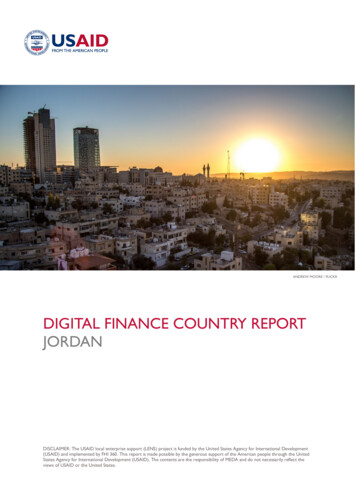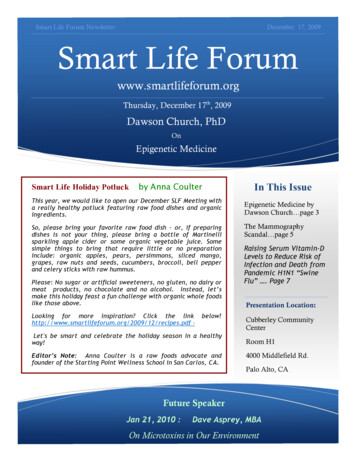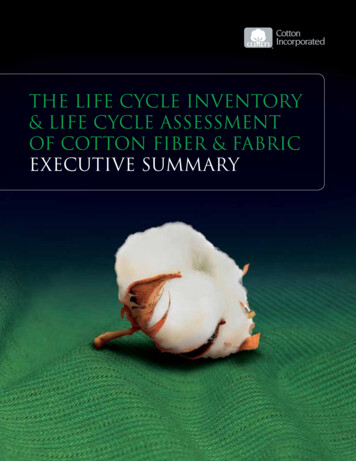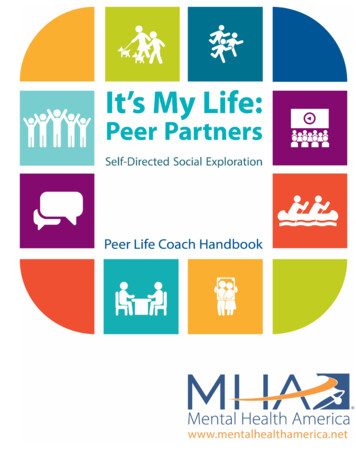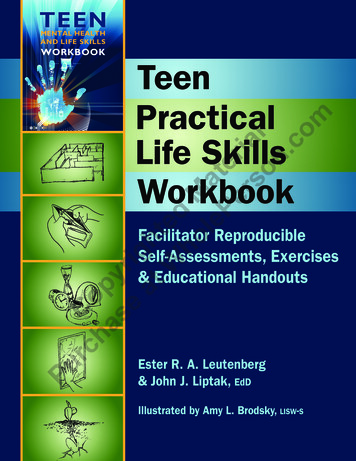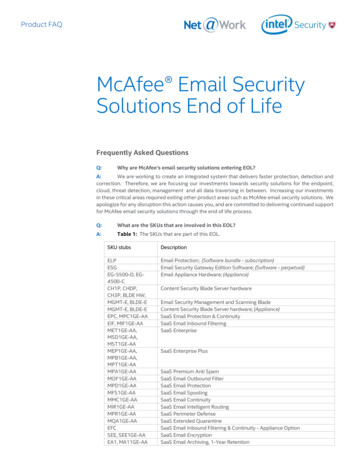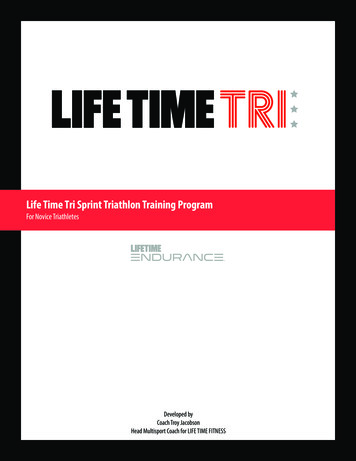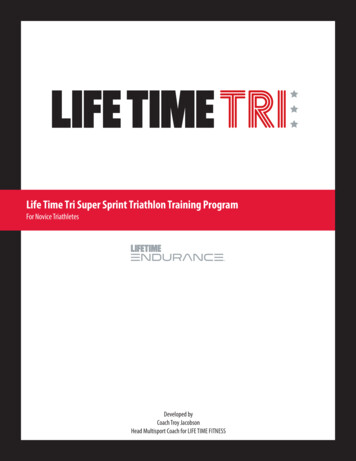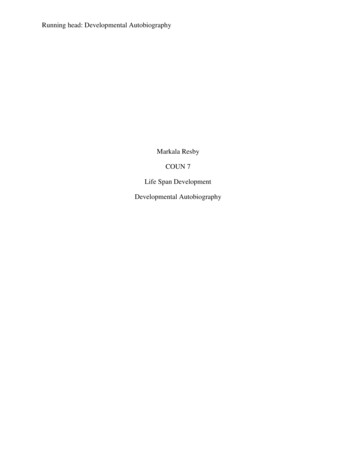
Transcription
Running head: Developmental AutobiographyMarkala ResbyCOUN 7Life Span DevelopmentDevelopmental Autobiography
Running head: Developmental AutobiographyDemographic InformationI am Markala Catrina Resby, a thirty-one year old single, African American Christianfemale. I was born March 11, 1982 in Junction City, Kansas. I was born to Hoyt and JuanitaResby, both of African American descent. My father’s primary occupational endeavors includeboth military and security experience; and my mother has always been an early childhoodeducator. My parents have been married for 35 years and have four children including myself.Although my father is not my sibling’s biological father, they all consider him to be a consistentfather figure.I have two sisters and a brother whose ages range from forty-three, forty-two, and fortyone. I am the youngest and due to the disparity in age between my siblings and me, I spentmajority of my life raised as an only child. My siblings have both children and grandchildren, inexception to my brother who lives with my parents due to his developmental disability. I have anextremely close and supportive relationship with my siblings, their children, and theirgrandchildren.As previously mentioned, both my parents and I are primarily of African Americanethnicity. My maternal grandfather was biracial; having an African American father and a NativeAmerican mother. Although my mother seemed fond of her Native American bloodline, she hasno information regarding her Native American culture. My father has expressed that hisgrandfather was biracial, with both African American and Caucasian parents. Although myethnic background extends beyond African American descent, I have no connection to otheraspects of my racial make-up.
Running head: Developmental AutobiographyMy upbringing incorporated strong aspects of religion and spirituality. My earliestmemories of my spiritual development were at the age of four, where I would often imitate mychurch and religious experiences. At age eight, I began to consciously adopt the religious beliefsof my parents. Throughout my middle age and adolescent years, I continued to follow my familyof origins’ religious values and practices and rarely objected their faith. In emerging adulthood, Ibegan to define my own beliefs which account for my own spiritual experiences anddevelopment.Throughout my life, my family’s socioeconomic status has significantly changed. Whilein the military, my family of origin would have been considered middle-class. My earlyrecollections tell of a nice, spacious family home with moderately expensive possessions. Oncemy father informally retired from the military, our socioeconomic status changed considerably.Throughout the remaining time in which I lived with my parents, my family lived in eithermobile homes or low-income housing. There were times in which my family receivedgovernmental assistance by means of food stamps and cash assistance. There were also times inwhich our housing was unstable, primarily due to relocating for economic advancement. Attimes, we resided in high crime areas, or areas in which I believe contradicted my internalfamilial structure. Although we lived in such communities, my parents valued education,spirituality and family structure. My parents now reside in a stable housing community whichmore accurately reflects similar values of family structure.
Running head: Developmental AutobiographyPictorial Evidence of Demographic InformationThe first set of pictures show my mother while pregnant with me; my sister holding me at twomonths; and my family of origin, minus my sister who is taking the picture. The second set ofpictures includes, me along with my parents; and my sister and I being playful.The above picture is a snapshot of one of the few communities in where my family and I resided;my brother is also pictured to the left.
Running head: Developmental AutobiographyPhysical DevelopmentAt birth I weighed 8 lbs ¾ ounces and was 21 ½ inches long. My mother described me asa fairly large baby and stated that although her pregnancy and delivery were normal, she wasquite uncomfortable. My growth pattern was pretty consistent throughout all developmentalstages, as I was overweight and obese. I began to gain weight at the age of four and was slightlylarger and taller than my agemates. Although I was not particularly aware of my weight duringearly childhood, I do recall feeling inadequate during times of physical activity. I rememberbeing uncomfortable with the game “Musical Chairs,” as I would often bump into my peerscausing them to fall. Although they enjoyed the contact, my teachers did not and I was often toldto sit out the rest of the game.There are a few attributions in which I consider to have played a role in my childhoodobesity; my family background being one. As aforementioned, there were times in which myfamily received food assistance; being so, it was important for my parents to shop economicallywise and not nutritionally wise, which resulted in high-caloric, high-fat foods. Research hasshown that factors including family stress and the propensity of purchasing low-cost, high-fatfood, contribute to obesity in childhood (Berk, 2010). Although my parents seem to have madeprovisions for nutrition by mostly cooking at home, the choice of food was not necessarily thehealthiest.Another contributing factor to my childhood obesity was my culture, as race and incomefrequently foretell both health and educational outcomes for children (Madsen, Hicks, &Thompson, 2011). Being African American and my family’s lower socioeconomic status bothplayed a role in my childhood obesity as research has shown a relationship between AfricanAmerican children of lower socioeconomic status and childhood obesity (Berk , 2010).
Running head: Developmental AutobiographyThe idea that my mother was overweight also contributed to my childhood obesity aschildren of overweight parents often become overweight or obese themselves (Berk, 2010). Iadopted my mother’s eating habits which were pathological and maladaptive. I would experiencemy mother’s negative moods and would witness her eating behaviors in response to heremotional state. Soon after I began the same maladaptive behavior and as research has suggested,I began to respond more to my external stimuli and neglected my internal hunger cues (Berk,2010).My weight factor continued throughout my middle childhood, adolescence, andadulthood. In congruency with research, and once being an overweight child, I became anoverweight child. Research suggests that overweight children stand a greater likelihood ofbecoming overweight adults (Berk, 2010). As an overweight adult, I have encountered numerousemotional battles including depression. I have defied studies which suggest the disparity ofoutcomes for overweight individuals such as graduation rates, job success and cardiovasculardisease (Madsen, Hicks, & Thompson, 2011), as I did not suffer academic failure in mychildhood, graduated high school, and pursued higher education. Also, although I am aware ofstereotyping against my size, I have not experienced much blatant discrimination as suggested byresearchers in that obese adults experience discrimination in areas of dating and mate selection,career advancement, financial aid assistance, and apartment rental selection (Berk, 2010). Myweight was not the only factor which contributed to my physical development as I also sufferedwith myopia at the age of five, in which I began to wear glasses to correct the malady.Even though research suggests that overweight and obese children are less active thantheir normal-weight counterparts (Berk, 2010), I was quite active as a child. I never seemed tohave problems with my gross motor development and fared well in agility, balance, and
Running head: Developmental Autobiographyflexibility, which increases in middle childhood (Berk, 2010). I recall playing jump rope games,dodge ball, and kickball in which I played exceptionally well. In the 6th grade, I joined thevolleyball team and played until my eighth grade year.Although my gross motor development, spurred in my middle childhood years, my grossmotor development took a slower path in my early childhood years. My parents recall that I didnot begin walking until around 16 months due to the fact that my siblings often carried me. Myparents also stated that I did not run as normal children, but instead I leaped and skipped. Eventhough my early childhood gross development took a more delayed trajectory, my grossdevelopment remain steady into my adolescent years, as I was a part of my high school marchingband as a member of the flag corps team, where I had to rely on continued balance, agility,coordination, and overall physical fitness. My physical activity level would soon plateau as Ientered emerging adulthood and early adulthood, as I led a more sedentary lifestyle. Recently, Ihave begun an exercise regimen which as research suggests, has increased my mental healthstate, as overall exercise promotes cognitive functioning and psychological well-being (Berk,2010).My fine motor development was typical throughout all spans of development. Somedevelopmental tasks in which I achieved at the age of five was learning to tie my shoe and writemy entire name. I remember being persistent in learning this tasks and often sought theassistance of my siblings or parents. During middle childhood, I recall struggling with learning towrite cursive although I preferred cursive over print because I thought it was “prettier.” I neverthought I had particularly nice handwriting and would often practice my writing while at home. Iremember my mother gave me a journal for my ninth birthday, to promote my handwriting skills.
Running head: Developmental AutobiographyPuberty was somewhat of an awkward time for me, as I reached sexual maturation withthe onset of menarche at the age of eight. Research suggests that overweight and obese childrenmay reach puberty at earlier ages than normal-weight peers (Berk, 2010). Although I feltparticularly uncomfortable, the awkwardness was mainly experienced at school and from thetaunts of male peers. My family provided support and a sense of pride as I reached puberty. Iremember my mom and my sisters both sharing their “period” experiences with me, whichprovided a sense of normalcy. Studies show that African American families are more likely towelcome the onset of puberty which accounts for better body image perceptions of adolescentAfrican American females (Berk, 2010).Adolescence is a time of both physical and mental developments which is accompaniedby psychological changes as well (Kiran-Esen, 2012). Although I experienced bullying by malepeers, I was often looked up to by my female peers regarding my breast development and mymenstrual experiences. Due to my mature look, I always felt as though my teachers expectedmore from me in terms of my behavior, which resulted in earlier maturation development. Still inearly adulthood, people often comment on my maturity, stating I behave older than I appear.Although research states that there is a relationship between early puberty, poor schoolperformance, greater levels of peer pressure, and adjustment concerns (Berk, 2010), I did notshare the same experiences, as I obtained academic achievement, was considered a peer leaderand adjusted to pubescent development just fine.
Running head: Developmental AutobiographyPictorial Evidence of my Physical DevelopmentThe set of pictures on the left shows my height and weight in comparison to my peers. Thepicture on the left is me in the 6th grade where I weighed approximately 230 lbs.The picture to the left is me at the age of 5wearing corrected lens for myopia. The picture also depicts my physical stature atthis age.
Running head: Developmental AutobiographyCognitive DevelopmentMy cognitive development was particularly regular throughout my life spandevelopment. My mother reported that I began speaking at eight or nine months with onesyllable words in addition to “mama/dada.” My parents stated that once my languagedevelopment began to occur, it was difficult to keep me quiet. My parents stated they often spoketo and with me, enticing conversation. Research in language development states that the degreeto which caregivers speak to children is vital in language development (Berk, 2010).Although my cognitive and language development was typical, there wereinconsistencies in my achievement. When I attended kindergarten, I received educationalservices for higher achievement due to scoring particularly high on the California Achievementassessment. My special services shifted from the promotion of achievement to supplemental andsupportive educational services while in the third grade. The extra support must have assisted inmy success, since I no longer needed support after the fourth grade.As previously stated my development was pretty much mainstream and supported bydevelopmental markers such as Piaget’s stages of development. In the sensorimotor stage, myparents reported they supplied me with ample toys to support this stage. I recall viewing picturesin which I was playing with manipulative toys which supported the concept of objectpermanence. My siblings also spent countless hours playing peek-a-boo with me as well. Myparents also stated that I did a lot of imitation. I believe during this period, social learning alsoplayed in important role as my older siblings often offered support for more challenging tasks.As I developed into the preoperational stage my development continued along the similarpath of Piaget’s stages of cognitive development. Along with my own recollection, my parents
Running head: Developmental Autobiographyreported that I spent endless hours in make-believe play during this stage. I remember havingsophisticated real-world symbolization in my make-believe play and would often substitute realobjects for representative objects such as turning a chair upside down, while pretending the chairwas a car. Sociodramtic play also played a role in my cognitive development during this stage Irecall frequently playing “house” with peers. During this play, I would often assign the motherrole to myself and other roles to my peers. I believe it was during this stage where the idea ofpeer relationships became important to me as research suggest that play is a reflection of bothcognitive and social skills (Berk, 2010). My parents often kid me that I use to bribe my friends inhopes that they will continue to play with me.During this stage I also recall using egocentric or private speech. I had no regard to mysurroundings and would use private speech to guide my play particularly when working onchallenging tasks, as research suggests (Berk, 2010). I remember my siblings interrupting myplay or tasks by asking me “who are you talking to?”As I began to understand language and emergent literacy, I was eager to learn thealphabet and began reading simple books around the age of five. My parents often praised myefforts and encouraged further learning. I can recall memorizing symbols and signs particularlyto frequent locations such as the laundry mat and grocery stores.During the third stage of Piaget’s cognitive development, concrete operational stage, Ibegan to develop some challenges in certain concepts such as reversibility and more advancedconservations. These difficulties would begin to hinder my abilities in mathematics. I didparticularly well in other concepts such as elaboration and I began to create relationships with
Running head: Developmental Autobiographyconcepts and words in order to better recall the information. This was particularly true whenlearning new vocabulary or spelling words.During this period I also began to understand metacognition and understanding how Ibest learn. It was not until I was scolded by my parents after doing poorly on assignments that Ibegan to assess my learning strategies. I began to understand that I must focus in terms ofstudying, in order to do well on assignments, especially in math and social studies. It was duringthis period that I began to feel pressure from my parents and peers as we would often comparegrades received on assignments.In the final stage of Piaget’s cognitive development, formal operational, I continued todevelop my metacognition and academic self-regulation. As in the previous stage I began toexperience pressure from both peers and parents. This pressure often led to me reassessing whatwas or was not working in terms of my academic achievement. Research states that adolescentscombine and interpret information received from peer and social groups, as cognition maturesand perception expands (Kiran-Esen, 2012). Despite my developing academic self-regulation,my knowledge of what was needed to maintain academic success was often contradicted withemerging cognitive distortions such as imaginary audiences. I remember obtaining my onlyfailing grade in high school, after completing my Spanish course. The course requiredparticipation and I was particularly self-conscious in my freshman year of high school.During this period, my decision-making skills also emerged and developed. My peerrelationships greatly impacted my choices. Although I was succeeding exceptionally wellconsidering factors which would suggest poorer academic success (i.e., obesity, lower SES, earlysexual maturation), I still grappled with career choices and considered attending a local technical
Running head: Developmental Autobiographycollege. My peers pressured me to take the SAT, apply for and attend the same college in whichthey had chosen. Thankfully, in this regard, I fell into the pressure of my peers and began myprocess of obtaining higher education at Georgia Southern University instead of AthensTechnical College. Research suggests that peers play a strong role in molding life choices andtransitions from adolescence into adulthood (Kiran-Esen, 2012).My peer relationships played in important role in where I am currently in terms of myacademic process. Although I am the only individual out of my peer group who has gone on topursue a graduate degree, my supportive relationships with both my family and my peers hasplayed a role in my continuation of my master’s degree, even when life presented challenges. Mycognition continues to development in my graduate experience, as my metacognition deepens. Inow try to understand why I do certain learning strategies and try to sharpen those strategies. Ihave also witness a change in my relativistic thinking, in that I no longer accept the word ofeducators or colleagues as absolute truth, but learn to develop research strategies which examinethe ideas and concepts presented to me.
Running head: Developmental AutobiographyPictorial Evidence of Cognitive DevelopmentThe above pictures show my early experiences in the preoperational stage. The picture on the leftshows me finger painting while at school. The picture on the right shows me in make-believeplay with my favorite doll Jennie.The picture to above shows my 5th grade academic report card.
Running head: Developmental AutobiographySocial Personality DevelopmentMy parents interactions have shaped the person I am today. My parents recall that theysupported my independence within respectful boundaries. My parents often nostalgically retellstories in which they considered me to be “bossy.” Although I have shaped my personality fromchildhood (i.e., becoming less “bossy” and more assertive), I attribute most of personalitydevelopment to my family of origin and the environment in which they created, and to lessmanipulative social environments such as school.Majority of my emotional development was positive, in which I resolved majority ofErickson’s psychosocial stage. In the first stage, basic trust vs. mistrust, my parents created inenvironment of trust, which supported my exploration of my environment. My parents stated thatat times I was too explorative and would often get into things in which I had no businessexploring.In the next stage, autonomy vs. shame and doubt, my parents provided opportunities topromote my self-confidence but were at time stern and unreasonable in regards to toileting. I donot think I completely resolved this stage as at times, I am dependent upon my parents(particularly my mother) when making decisions. There were times in which my mother had a“do it now, as I say” behavioral method, which created dependency. Even now in earlyadulthood, I seek my mother’s approval of major life choices. This unresolved characteristic ofthis stage is in agreement with research that suggests that when parents are over and undercontrolling, children tend to doubt their ability to control impulses and to behave competently(Berk, 2010).
Running head: Developmental AutobiographyIn Erickson’s initiative vs. guilt stage, I recall engaging in a lot of play activities whichallowed me to try out newer skills without criticism (Berk, 2010). My parents encouraged playand often praised my creativity. There were times however, when my strides towardindependence caused me to be reprimanded which created feelings of guilt and wrongdoing. Myparents did however support my self-esteem by offering praise for new tasks such as learninghow to read or learning all my spelling words.In industry vs. inferiority, although my parents created reasonable expectations indeveloping and acquiring new tasks, my social environments did not always support my selfesteem, as I often received criticism on certain tasks. I now attribute most of the criticism to thestereotypes associated with my weight. My parents supported my readiness of this stage bypromoting my music abilities. I remember my parents registered me for an advanced summermusic program, in which I was in with students who were two grades above me. My parentsoffered support and encouraged me to complete the program despite my constant request to quit.In the next stage of psychosocial development, identify vs. role confusion, my parentssupported this stage by encouraging me to participate in a vocational exploration program calledMedical Explorers, since I desired a career in the medical field. This exploration allowed furtherinvestigation into career choices and to consider personality traits in regards to occupationalcareers.In the final psychosocial stage in which I am currently in, intimacy vs. isolation, Icontinue to grapple with the decision of making permanent commitments, such as marriage andparenthood and the potential loss of my independence while making these commitments. Thereis a sudden urgency to resolve this stage as I age. I find myself pressured by both the social and
Running head: Developmental Autobiographythe proverbial biological clocks. I find myself comparing my accomplishments to those of mypeers. I also feel social pressure from my family and parents in regards to marriage and children.Although I feel social pressures to attain certain career and personal objectives, I alsoplace pressure on myself in terms of selecting a mate. I struggle with the idea of remaininglonely while exerting my independence. Research suggests that loneliness can promote selfawareness (Berk, 2010). During this period of singlehood, I rely on the support of my peers andfamily and I continue self-reflection to gain better insight of myself.Overall I contribute my emotional development to the secure attachment formed with myparents as an infant. Because of those secure attachments, I seek relationships which providesupport, trust, and genuine love (Berk, 2010). Because my parents matched their disciplinetechniques with my temperament, creating a goodness-to-fit environment, I was able tosuccessfully resolve many psychosocial issues associated with emotional development. I believethe development of my temperament supported by my parents, provided opportunities to developa resilient personality, which combated many of my social implications such as my parents’socioeconomic status and my emotional battles with my weight. As suggested in research,personality is developed through temperament and experiences (Rothbart, 2007). Theenvironment in which my parents created helped to mediate the relationship betweensocioeconomic factors, in which parenting behaviors have been found to do (Tucker-Drob &Harden, 2012).Moral DevelopmentMuch of my moral development centered on my relationships and interactions with mypeers and my immediate social influences. In my early childhood development, my morality was
Running head: Developmental Autobiographydeeply rooted in my familial upbringing. My parents valued morality and “doing right” in termsof religious morality. More times than not, my parents would provide an explanation as to whymy behavior was considered immoral or they would provide inductive reasoning, such as “ithurts when you hit.” My parents supported my moral development in terms of me caring forothers, as research suggest feminine morality highlights the aspect of “care” (Berk, 2010). Mymother reinforced behavior which supported this principled idea particularly in my playactivities. My parents offered immediate repercussions for immoral behavior, but at times thoserepercussions caused shame and guilt to develop. This stage coincided with Kohlberg’spreconventional level, stage 1.There are extreme gaps in my middle childhood moral development. I do remember that Iwas somewhat of an enforcer of morality in which I would constantly point out immoralities,which would lead to me being considered a know-it-all amongst my peers. Religious moralitywas still imperative to my parents during this period. I do not recall any liberty to expresspersonal choices in regards to religious values until adulthood. I was raised with the notion, “ifyou live under my roof, you will obey my rules.” During this period, I also grappled with socialmorality and religious morality. I desired to be accepted by friends which would at timescontradict my religious morality. This stage would represent Kohlberg’s stage 3 on theconventional level.During my emergence into adulthood, peer relationships still influenced my moralitydevelopment. Research suggests that peers are sources of influence and provide avenues forconflict and adoption to differing values (Kiran-Esen, 2012). I began to be able to view moralityin terms of a flexible and changing concept and began to see morality through the perspective ofothers. During this period, my undergraduate and graduate experience provided much
Running head: Developmental Autobiographyopportunity for perspective taking and examination of justice and ethics. This stage of my moraldevelopment reflects multi-stages of Kohlberg’s moral development, including, stage 4 of theconventional level and elements of the postconventional principled levels.Pictorial Evidence of Moral DevelopmentThe above picture depicts a poem titled forgiveness, which was written in my 10th grade class.Although I was not aware of it at the time, this poem tells of my emergence into the Kohlberg’sconventional level of morality. The poem portrays the struggle to obey social and religious rulesand promote social harmony. The poem also shows the struggle between acceptance by otherswhich may result in acts of sin or religious immorality.
Running head: Developmental AutobiographySummaryThere is a cohesive theme of development throughout my life span. There were manytimes in my development, where the developmental domains interacted with and wherecontingent upon the development of another domain. Although most of my developmentproceeded within developmental norms, there were times in which research opposed my actualdevelopmental experience, such as my cultural background in terms of physical and cognitivedevelopment. I attribute that opposition to my development of resiliency and I contribute myresiliency to my familial nurture. Research has shown that protective factors, such as nurturingcaregivers, social and emotional competencies and meaningful participation at school, canprovide successful development (Madsen, Hicks, & Thompson, 2011) all to which myexperiences have accounted. Whether my development traveled a traditional course or whetherthere were times in which my development seemed off course, all facets and domains havecongruently worked together to form the person I am today.As I synthesize my insight in which I gained from exploring my developmental history,there is no denying that even the subtle and overt aspects of my family of origin and culture, allplayed a role in my development. By exploring my developmental life span, I have gainedinsight into some reoccurring themes that I have yet to resolve. I have also begun to betterunderstand the relationship between nature and nurture in my own life. It is interesting to seehow my life experiences could have been completely different, if I was born into a less caring,less supportive and less trusting family. One aspect in which I did not address is the role inwhich my parents’ developmental themes played in the manner in which they interacted with me.This emerging insight has caused me to continue to resolve some aspects of my development
Running head: Developmental Autobiographywhich I have control over, as to not transfer those aspects into approaching developmentalstages, which hopefully include marriage and children.
Running head: Developmental AutobiographyReferencesBerk, L.E., (2010). Development through the lifespan (4th ed.). Boston, MA: Allyn and Bacon.Kiran, B., (2012). Analyzing peer pressure and self-efficiency expectations amongadolescents. Social Behavior and Personality, 48 (8), 1301-1310.Madsen, K.A., Hicks, K., & Thompson, H., (2011). Physical activity and positive youthdevelopment: Impact of a school-based program. Journal of School Health, 81, 462-470.Rothbart, M.K.,
Life Span Development Developmental Autobiography . Running head: Developmental Autobiography Demographic Information I am Markala Catrina Resby, a thirty-one year old single, African American Christian female. I was born March 11, 1982
